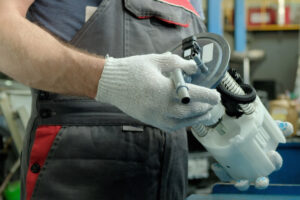Is A Fuel Pump Covered Under Warranty?
Is a fuel pump covered under warranty? If your car is covered under a manufacturer or factory warranty, repairs are generally covered at no cost to you. However, most manufacturer warranties only last a certain amount of time or mileage, with most standard factory warranties ending at 3 years or 36,000 miles. If your car’s fuel pump unexpectedly breaks and your manufacturer’s warranty expired, then you’ll left paying those costly repair bills on your own.
It’s important to check the warranty information for your specific vehicle before making any repairs. Some warranties may cover the cost of repairs, while others may only cover the cost of replacement parts.
Manufacturer Warranty
Fuel pumps are commonly covered by the vehicle’s Manufacturer Warranty. This coverage typically applies to defects in materials or workmanship during the warranty period. The warranty duration for a vehicle’s fuel pump can vary. It may range from a few years to the vehicle’s lifetime. A manufacturer’s warranty is considered to have Exclusionary Coverage, these types of warranties tend to exclude things such as glass and plastic Check your vehicle’s warranty documentation or contact the manufacturer for coverage period.
Manufacturer warranties frequently include exclusions, such as coverage for typical wear and tear or damage resulting from accidents, misuse, or modifications by the owner. Should your vehicle’s fuel pump experience a problem covered by the manufacturer’s warranty, you can usually get it fixed or replaced at an authorized dealership or service center. In order to secure warranty coverage for your vehicle, proof of ownership is typically required. This can be provided through your vehicle’s registration or purchase documents.
Extended Warranty
Consumers may choose to buy extended warranties for their fuel pumps. These are frequently provided by third-party companies or retailers and can offer coverage beyond the manufacturer’s warranty. Carefully review the policy to understand the coverage and circumstances for repairs under extended warranties.
The Mopar Maximum Care Warranty, also known as the “bumper-to-bumper” warranty, is the most comprehensive extended coverage available for Chrysler, Dodge, Jeep or Ram. It extends your Chrysler, Dodge, Jeep or Ram’s powertrain and basic component coverage beyond the 3-year/36,000-mile manufacturer’s warranty. Additionally, it covers more than 5,000 components, providing virtually complete mechanical coverage for your vehicle.
The only components not covered under this warranty include:
- Maintenance services and items used in such services.
- Glass, plastic lenses.
- Body and paint items, including soft trim.
- Wear items such as manual clutch assembly, brake pads, shoes, rotors, drums and belts are not covered at any time.
- Snowplows, winches and trailer hitches
How Much Does It Cost To Fix Your Fuel Pump?
The actual cost of replacing a Fuel Pump depends on several factors. The parts cost of a fuel pump is usually between $75 and $250, depending on the vehicle. If you are replacing the fuel pump yourself, beyond this it is just the cost of your time. Generally speaking, replacing a fuel pump is considered an intermediate-level task.
If you decide to go with a professional, you may be looking at a cost of between $400 and $600 to replace a bad fuel pump. You can search through our Preferred Shops in your area for a mechanic that can help with the fuel pump repair. Expect the actual replacement to take between 1 to 6 hours, depending on the expertise of the mechanic and the tools they happen to have on hand.
Signs Of A Bad Fuel Pump
A faulty fuel pump can lead to a wide range of symptoms and engine performance problems. Common issues include:
- Engine Won’t Start. A gasoline engine needs three basic things to run: spark, fuel and compression. A faulty fuel pump can prevent fuel from reaching the engine, resulting in a vehicle that won’t start.
- Lack Of Power. An engine that is starved for fuel due to a weak fuel pump may suffer from lack of power and sluggish acceleration.
- An Engine Misfire. Complete combustion requires the proper amount of fuel and air. A bad or failing fuel pump can result in an air/fuel mixture that is lean. This can result incomplete combustion, otherwise known as a misfire.
- Sputtering Or Surging Under Large Loads. The engine requires more fuel under heavy loads. A weak fuel pump can’t meet this demand. As a result, surging may occur.





